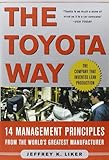The Machine that Changed the World
https://www.amazon.com/Machine-That-Changed-World-Revolution...
Toyota Production System Beyond Large Scale
https://www.amazon.com/Toyota-Production-System-Beyond-Large...
The Toyota Way
https://www.amazon.com/Toyota-Way-Management-Principles-Manu...
Out of the Crisis
https://www.amazon.com/Out-Crisis-W-Edwards-Deming/dp/091137...
Getting Things Done, David Allen [1]. Useful toolkit for getting things out of my head and onto paper (or org-mode or OmniFocus) so that I can properly focus and prioritize my time on the things I need to get done.
Communicating Sequential Processes, C.A.R. Hoare [2]. Strongly influenced the way I think about programs in general, but specifically in the embedded field where I work. (NB: I've not actually read or worked through the full text, but mainly taken what was needed to properly communicate ideas in my designs or to analyze designs and systems others have produced. This is a task for myself for early next year.)
Moonwalking with Einstein, Joshua Foer [3]. I've always had a good memory, I actually picked this up to give to a girlfriend who had a terrible memory and read it in a couple days before giving it to her (she was out of town when it arrived). Helped to explain methods that I'd somehow developed over the years, and gave me concepts and a better understanding of other methods of memory acquisition (for either short or long term purposes). If you really want to improve your memory, there are probably better resources to learn specific techniques, but this was an informative and entertaining overview. WRT work, we have to keep large systems in our minds all the time, and potentially dozens of different systems written in different languages. Memory is critical for this, even if it's just the memory of where to find the information and not the information itself.
Fluent Forever, Gabriel Wyner [4]. This one is my current read. Goes back to Moonwalking with Einstein. While the book is itself about language acquisition, it's actually given me quite a bit to think about with respect to general learning and memory acquisition (in this case, specifically for long term retention and recall). We have a couple training programs (we need more) for our new hires on development and testing. There are some concepts in here and in related readings that I think would greatly improve how we teach these folks what they need to know and in a way that would improve their retention of that information. We have a lot of people retiring in the next 1-3 years, so this is actually quite critical right now, though management is quite lackadaisical about it.
[0] https://www.amazon.com/Mythical-Man-Month-Software-Engineeri...
[1] https://www.amazon.com/Getting-Things-Done-Stress-Free-Produ...
[2] http://usingcsp.com/cspbook.pdf
[3] https://www.amazon.com/Moonwalking-Einstein-Science-Remember...
[4] https://www.amazon.com/Fluent-Forever-Learn-Language-Forget/...
=========================================
EDITS:
The Toyota Way, Jeffrey Liker [5]. I grokked Lean from this. Hardware focused, but the concepts can be (and have been) generalized to other process focused fields. This has helped with understanding what business processes really need to be codified, what feedback mechanisms need to be present for improvement, the criticality of bottom-up feedback and improvement (employee investment in the company/product cannot be overvalued if you want quality and good craftsmanship).
The Little Schemer, Friedman & Felleisen [6]. Going back to the comments on Fluent Forever. The structure of this is fantastic for conveying and helping students retain information. The Socratic method is very useful, and structuring courses and introductory material in this format is useful, this happened to be my introduction to it (well, I'd heard it before, but my first time really encountering it in practice). It's a useful tool for solo-study of a topic (pose your own questions and construct answers), and as a method of guiding someone to a conclusion or better understanding. Also useful in debugging software or decoding software you didn't write, after a fashion.
[5] https://www.amazon.com/Toyota-Way-Management-Principles-Manu...
Start with Wikipedia: http://en.wikipedia.org/wiki/W._Edwards_Deming
Continue to this blog: http://blog.deming.org/
Read his dry and horribly written book if you want: http://www.amazon.com/Out-Crisis-W-Edwards-Deming/dp/0262541...
Or just head straight to something relevant and practical: http://www.amazon.com/The-Toyota-Way-Management-Manufacturer...
Moral of the story: Quality (all-encompassing quality, including everything from simple operational effectiveness, to market fit and understanding) comes from systems thinking.
http://www.amazon.com/Toyota-Way-Jeffrey-Liker/dp/0071392319
It is much, much more than a 'lean system', although one of their major goals is to eliminate waste.
I'm also big fan of their 'go and see for yourself' (genchi genbutsu) philosophy.


- The Essential Deming: Leadership Principles from the Father of Quality: https://www.amazon.com/Essential-Deming-Leadership-Principle...
- The New Economics for Industry, Government, Education: https://www.amazon.com/Economics-Industry-Government-Educati...
- The Toyota Way: 14 Management Principles from the World's Greatest Manufacturer: https://www.amazon.com/Toyota-Way-Management-Principles-Manu...
Deming is really a great thinking in the area of product development and agile methodologies.